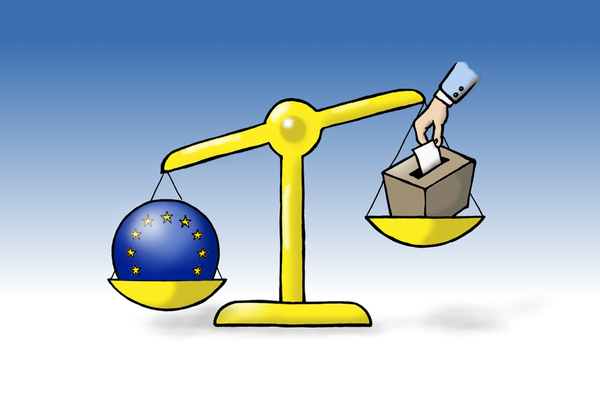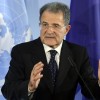Is the EU a threat to democracy or its guardian?
François Hollande has declared the EU ‘remote and incomprehensible’, and David Cameron has accused it of being ‘too big, too bossy, too interfering’. Even the former European Commission president José Manuel Barroso has called for a ‘truly democratic debate’ on the future of Europe.
The real power in the EU rests with the member states in the Council and with the bureaucrats in the European Commission, rather than in the elected European Parliament. And the EU has what amounts to a veto over the expressed will of non-member states such as Switzerland.

While EU politicians openly worry about the so-called ‘Eurosceptic earthquake’, which manifests itself in low voter turn-out, public apathy and public disengagement. They are also contemptuous of popular and militant anti-EU parties; the supporters of which they denounce as racist, backward and ignorant.
But if the EU is really so dismissive of and remote from the masses, why, seemingly, do most citizens still want to remain members? Why is there, undoubtedly, a waiting list of nations to join? For instance, the people of Ukraine are apparently willing to die to become a member of the EU and have their representatives sitting in the European Parliament.
Do the Commission, Parliament and Council of the European Union really have the right to decide policy and the law on behalf of member and non-member states; even when the majority of people of a particular nation state are clearly opposed? Or is the EU a legitimate institution that combines the best elements of our common values and democratic ethos? In other words, does the EU ensure that we never again slip into xenophobia and backward forms of rule, so that we maintain an epoch in which European nations are prosperous, interdependent and free? Or does it threaten national sovereignty?
Recommended reading:
-
A New Government
The Times Editorial
Indications of a sensational late swing to the Conservatives put them in a commanding position to form a new coalition and lead Britain to a European referendum and beyond. That, at least, was the message -
General election: France must craft EU strategy after Tory win
Financial Times, François Heisbourg, special adviser at the Paris-based Fondation pour la Recherche Stratégique
Paris is less amenable than Berlin to accommodating London’s demands.
Paris will now have to craft an operational policy, sooner rather than later given that there is an EU Council meeting next month. This will entail the crafting of a joint French-German approach. The probability that the British referendum on EU membership will happen in proximity to France’s and Germany’s general elections will weigh on both countries’ negotiating postures. Chancellor Angela Merkel and President François Hollande will not want to be seen as giving in too readily to a country whose legitimacy as a full EU player is widely questioned on both sides of the Rhine. -
Der grosse Kampf steht noch bevor
Tages Anzeiger
Analyse: Historikerstreit, prominente Kandidaten, übermässige Medienpräsenz: Die SVP dominiert den Wahlkampf nach Belieben. Dabei sind die Wahlen nur der Anfang – die entscheidende Schlacht findet erst danach statt. Die drohende Abstimmung über die Zukunft der Schweiz in Europa bietet die Bühne für das einzige Thema, das der SVP wirklich wichtig ist: die eigene Souveränität. -
Wir sind gute Europäer
Christoph Blocher
Wir haben einen Vertrag mit Revisionsklauseln und Kündigungsfristen abgeschlossen. Den halten wir ein. Doch weil die Personenfreizügigkeit in eine Katastrophe mündet, hat das Schweizer Volk beschlossen, davon wegzukommen. Im Vertrag wurde vereinbart, dass das Abkommen zu revidieren sei, wenn es wirtschaftliche und soziale Schwierigkeiten gibt. -
Don't let Great Britain become Little Britain - stay in the EU
Richard Branson
If the United Kingdom ever decided to leave the European Union, people would wake up and realise they had made a very grave error indeed. A year ago I [Branson] wrote about the need for the UK to stay in the EU, and why it is so valuable to British businesses. Nothing has changed, but the argument rumbles on. -
When you join the EU you make a deal – Switzerland needs to remember that
John Springford is a senior research fellow at the Centre for European Reform in London
Last week [January], the Swiss government proposed a “safeguard clause” to limit EU immigration. British Eurosceptics’ ears pricked up: the proposal sounds remarkably like Downing Street’s “emergency brake” proposal, which David Cameron eventually backed away from in his immigration speech in November. Many within Ukip and the Conservative party would like Britain to withdraw to a Swiss-style relationship with the EU, which they hope would allow them to pick and choose. Should the Swiss succeed, British Eurosceptics will ask: if they can limit immigration from central and eastern Europe, why shouldn’t we? -
Care about democracy? Then smash the EU
Brendan O'Neil
Did I fall asleep and wake up in the fifteenth century? I ask because, according to news reports, the unelected lords of Britain’s second chamber are currently trying to prevent the British public from having a say on our relationship with unelected suits in Brussels. Enraged by Conservative prime minister David Cameron’s proposal that we should have an in/out referendum on Britain’s membership of the European Union in 2017, various lords have accused him of putting our nation’s fate in the hands of a ‘lottery’ in which much of the electorate, won over by ‘the daily war drums of the unyielding Europhobes’, will probably dumbly vote to leave the EU. -
«Wir stehen im Kulturkampf mit den Nationalkonservativen»
SP-Präsident Christian Levrat
Für Christian Levrat ist die Schweiz ein Land am Scheideweg. Im Interview spricht der SP-Präsident über Schweizer Geschichte, den Euro-Mindestkurs und die SVP als Giftmischerin.






